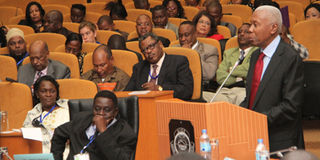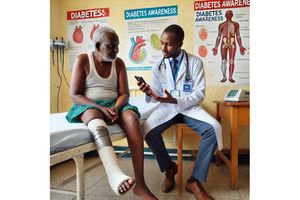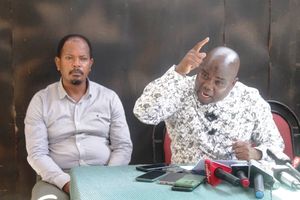Gharib Bilal: Here's why Africa needs to invest in science and technology

Vice President Gharib Bilal talks to delegates of the Commonwealth Parliamentary Association (CPA) – Africa during the opening of the 45th CAP-Africa Summit in Arusha on Thursday. PHOTO | Courtesy of the Office of the Vice President
What you need to know:
Africans would be deceiving themselves if they think they could progress without investing in science and technology, the Vice-President, Dr Ghalib Bilal, cautioned in Arusha yesterday.
Despite the lack of infrastructure, particularly laboratories and equipment to support effective teaching of science subjects, Africa must make itself more competitive by encouraging its youth to be curious and scientific.
Arusha. Africans would be deceiving themselves if they think they could progress without investing in science and technology, the Vice-President, Dr Ghalib Bilal, cautioned here yesterday.
Dr Bilal was opening the 45th Conference of the Commonwealth Parliamentary Association – Africa Region (CPA – AR) which has attracted lawmakers from 17 countries on the continent at the Arusha International Conference Centre (AICC).
While China produces 7,000,000 engineers annually, barely 20,000 engineers graduate in Africa -- a continent with the same population as that of the second largest economy in the world.
“We have to reverse this situation by charting strategies that will ensure our children develop interest in science subjects,” Dr Bilal remarked.
He said it could be done if sufficient funds were allocated for the construction of laboratories and training of science teachers.
The vice-president called on the conference delegates to consider the outcry of parents, employers and teachers when deliberating on parliaments’ role in addressing the decline in access to and quality of education in Africa.
He argued that the challenges of pursuing a career in science and technology were not exceptional to women and girls alone, as the majority of schoolboys were also averse to major in those subjects.
Lack of infrastructure, particularly laboratories and equipment to support effective teaching of science subjects, were also mostly to blame, he observed.
“To a less extent, this challenge is compounded by irrational fear among students that science subjects are difficult by nature,” he said.
The CAP International Secretary-General, Dr William Shija, said the region was crying out for issues being examined during the conference, urging that actionable remedies should be agreed and implemented across the continent.
Dr Shija said in a message read on his behalf by the CPA International President and Deputy Speaker of Cameroon, Mr Mban Ndam, that those issues were holding Africa back from achieving its full potential.
CPA-AR conferences provide a platform for lawmakers from across the continent to share ideas, experiences and best practices on the running and functioning of legislatures.




